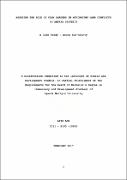Assesing the role of clan leaders in mitigating land conflicts in Amuria district
Abstract
Clan leaders are a group of elders selected from different clans to head. In Acowa Sub-county clan leaders have been involved in mitigating land conflict and as a result a number of land cases have been resolved successfully. However, though the Clan leaders have successfully mitigated a number of land cases, not much has been documented about them. It is upon this background that the researcher is assessing the role of clan leaders in mitigating land conflicts in Acowa Sub-county.
In assessing the role of clan leaders in mitigating land conflicts, the researcher had four specific objective objectives; to find out the different methods used by clan leaders in land conflict mitigation, to understand the process the clan leaders go through during land conflict mitigation, to explore the challenges and to identify ways that can enable clan leaders better respond to land conflicts. The researcher applied both qualitative and quantitative approaches to assess. The qualitative approach enabled the researcher present data numerically and qualitative approach enabled the researcher understand the value and interests. Data was collected through interviewing 53 respondents these respondents were got through purposive and random sampling. Self-completion questionnaires, observations and focus groups were used for collecting data.
The time scope for data analyzed was between 2008 and 2015. The overall results revealed that the clan leaders used arbitration, adjudication, mediation and negotiation during land conflict mitigation. These methods were applied during mitigations at clan, village, parish and Sub-county levels. However, the methods that scored highest in usage that brought mitigation of land conflicts were; mediation with 56.6% and Adjudication with 24.5%. Others were; Arbitration with 11.3% and Negotiation with 7.5%. The researcher also found out that the process of mediation started within the clans. At clan level the aggrieved party reported the matter to the clan head (Clan leader), the clan leader would later summon the two aggrieved to get details from each which he later shares with other clan leaders.
The researcher found out that the clan leaders did not move on smooth road, they faced some challenges for example; little knowledge on mediation, lack of funds to facilitate meetings, political interference, negative attitude by some community members on mediation and high expectations by communities during land conflict mitigation. To better the work of clan leaders, the following were the recommendations; clear land demarcation by family heads to ease the work of clan leaders, regular clan meetings and stakeholder involvement, identification of caretakers and training of clan leaders on mediation.


